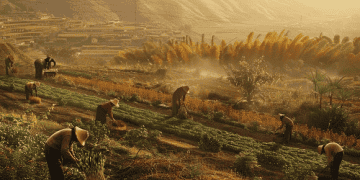Ongoing shifts in labor policies could lead to disruptions in the U.S. food supply chain, with experts drawing comparisons to the challenges faced by the United Kingdom after its withdrawal from the European Union in 2020.
Following Brexit, the U.K. experienced labor shortages that affected agricultural production and food supply chains, according to Barbara Guignard, a principal at global procurement and supply chain consultancy Efficio. She noted that restrictions on access to foreign labor created hiring difficulties, leading to supply instability and workforce shortages across various industries, particularly agriculture.
Similar concerns are emerging in the U.S., where labor availability plays a crucial role in sectors such as agriculture, food processing, and distribution. A reduction in available workers could impact key crop harvesting, processing facilities, and transportation networks, ultimately influencing food supply and pricing.
According to estimates from the Center for Migration Studies, over 8 million foreign workers contribute to the U.S. economy, with significant representation in industries such as construction, food service, and agriculture. The agricultural sector alone employs approximately 320,000 undocumented workers, while food processing and manufacturing rely on an estimated 200,000.
John Walt Boatright, director of government affairs for the American Farm Bureau, emphasized the importance of workforce stability for the food supply chain. He noted that while immigration policies may need updates, solutions should consider the needs of vital industries to prevent unintended disruptions.
In some areas, concerns about labor shortages have already affected local food distribution programs. A nonprofit organization in Detroit recently announced the suspension of its fresh produce delivery program due to supply chain disruptions at a Texas-based farm. However, industry leaders in Texas have reported that agricultural operations in the region have not yet experienced major disruptions.
Experts suggest that businesses can mitigate potential supply chain risks by diversifying supplier networks and strengthening relationships with key partners. Guignard advised food retailers and restaurants to explore alternative sourcing strategies to ensure continuity in supply, noting that a proactive approach can provide a competitive advantage during periods of uncertainty.
Explore top supply chain news stories at The Supply Chain Report. Visit ADAMftd.com for free international trade tools.
#SupplyChainNews #FoodSupplyChain #AgricultureTrends #LaborMarketImpact #LogisticsUpdate
















